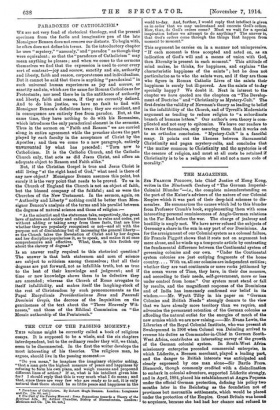PARADOXES OF CATHOLICISM.* WE are not very fond of rhetorical
theology, and the present specimen from the facile and imaginative pen of the late Monsignor Benson does not remove our distaste. To begin with, he often does not define his terms. In the introductory chapter he uses "mystery," "anomaly," and " paradox " as though they were equivalent ; so that the "paradoxes of Catholicism" may
mean anything he pleases ; and when we come to the sermons themselves we find that the expression is used to cover every sort of contrast—joy and sorrow, sanctity and sin, authority and liberty, faith and reason, corporateness and individualism. But it cannot be said that there is anything " paradoxical " in such universal human experiences as joy and sorrow, or sanctity and sin, which are the same for Roman Catholics as for Protestants ; nor need there be in the antitheses of authority and liberty, faith and reason, if they are correctly defined. And to do him justice, we have no fault to find with Monsignor Benson's definitions here ; they are excellent, and in consequence are entirely free from paradox. But, at the same time, they have nothing to do with his Romanism, which introduces the only paradoxical element in the sermons. Thus in the sermon on "Faith and Reason" we are carried along in entire agreement while the preacher shows the part played by each faculty in the acceptance of Christ by the Apostles ; and then we come to a new paragraph, entirely unwarranted by what has preceded ; "Turn now to Catholicism. It is the Catholic Church, and the Catholic Church only, that acts as did Jesus Christ, and offers an adequate object to Reason and Faith alike."
But, if the Christian Gospel is true and Jesus Christ is
still living "at the right hand of God," what need is there of any new object? Monsignor Benson assumes this point, but
surely it is the very point that needs to be proved. To us in the Church of England the Church is not an object of faith, but the blessed company of the faithful ; and so were the Churches of the New Testament. In the sermon, again, on "Authority and Liberty" nothing could be better than Mon- signor Benson's analysis of the terms and his parallel between the dogmas of natural science and those of religion :—
"As the scientist and the statesman take, respectively, the great laws of nature and society and reduce them to rules and codes, yet without adding or taking away from these facts, that are true whether they are popularly recognised or not—and all with the purpose not of diminishing but of increasing the general liberty— so the Church takes the Revelation of Christ and by her dogma and her discipline popularises it, so to speak, and makes it at once comprehensive and effective. What, then, is this foolish cry about the slavery of dogma? "
Is an answer really required to this rhetorical question ? The answer is that both statesmen and men of science are subject to criticism among themselves ; that all their dogmas are put forward, not as infallible truth, but as true to the beat of their knowledge and judgment ; and if time or new knowledge shows them to be defective they are amended ; whereas the Church of Rome arrogates to itself infallibility, and makes itself the laughing-stock of the rest of Christendom by such pronouncements as the Papal Encyclicals Pravidentissimus Deus and Pascendi Dominici Gregis, the decrees of the Inquisition on the genuineness of the text about the "Three Heavenly Wit- nesses," and those of the Biblical Commission on "the Mosaic authorship of the Pentateuch."














































 Previous page
Previous page